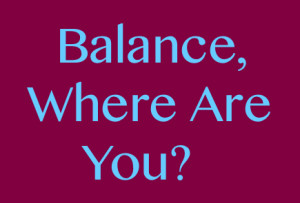I wonder if every new mom comes to a point where she asks herself, how do I balance all of this? I only have one child (bless anyone who has more than one), but I often feel as if my eyes are just barely peeking above the surface of the murky swamp. As a new parent, I can’t help but try to balance all of the advice I get—don’t wake a sleeping baby, don’t let him sleep too long, don’t let him get overtired, keep him awake during the day, don’t overstimulate him, schedule naps, nap on demand, and don’t you dare rock him to sleep. I search for balance in my life (as I bounce my four-month-old up and down with my knees—his favorite motion), and I begin to ponder how the elusive qualities of balance might extend beyond parenting.
In my independent study, I am reading some of the greatest contributors to the field of education—Dewey, Bobbit, Apple, and Freire (to name a few). And I get riled up. (If you know me, this shouldn’t be surprising.) Too many philosophers promote one style/theory of teaching, and we, as educators, are forced to juggle all of these philosophies and formulate our own. We read Kozol or Hirsch or Addams, and we try to mish-mosh their theories into one. Too often, philosophers push their theories as absolute, and while I often respect each theory, I crinkle my forehead when each is professed as the only theory. God forbid, when there are disparities between two of those theories, we feel like bad teachers because we see the merit in both. We want to feel firm in our beliefs. I read about Hirsch’s Cultural Literacy, for example, and I nodded in response when I read that our students must be prepared to emerge as literate adults who understand the language of American culture. And then I read his list of 5,000 words/phrases that EVERY literate person must know, and I shook my head. Perhaps, Hirsch is just one lens, and we, as teachers, are able to see our students through thousands of lenses. It seems that each philosophy we learn about adds a lens and makes our classrooms that much clearer.
I look to these philosophers, and I seek balance in my own philosophies, and I wonder why we find comfort in seeing qualities of life in black and white. I am, admittedly, guilty of this. When a friend posts a viewpoint that is so very different from my own, why am I compelled to post an argumentative reply? Can our polarized views—be them teaching, parenting, or politics—be balanced? What is it about this gray area that makes us so nervous?
And amidst this overwhelming stress of being a good mom, a good wife, a good keeper of the house, a good student, a good friend, and a good blogger, my son looks at me as I bounce him and lets out a belly laugh. Across the cyberspace, someone else’s son is laughing right now. That someone else might hold parenting views that are quite different from my own. And in another town, a teacher is grading assignments that are very different from my own. And what she is doing is working. So maybe this mom and I—and this teacher and I—maybe we are all right.

LOVED this post! What a great connection. Perfection.
Thanks, lady! You’re the best blog partner. **squeeze**
What a wonderful, thought-provoking post! As you might have already guessed, the balance thing doesn’t get any easier as the kids get older! Your words really struck a chord with me.
I love authors whose novels focus on this aspect of life – all the shades of gray (not 50!) – authors like Jodi Picoult who are constantly showing us that there are different, equally valid ways of viewing the same issue.
Great post – thanks!
Sue
Book By Book